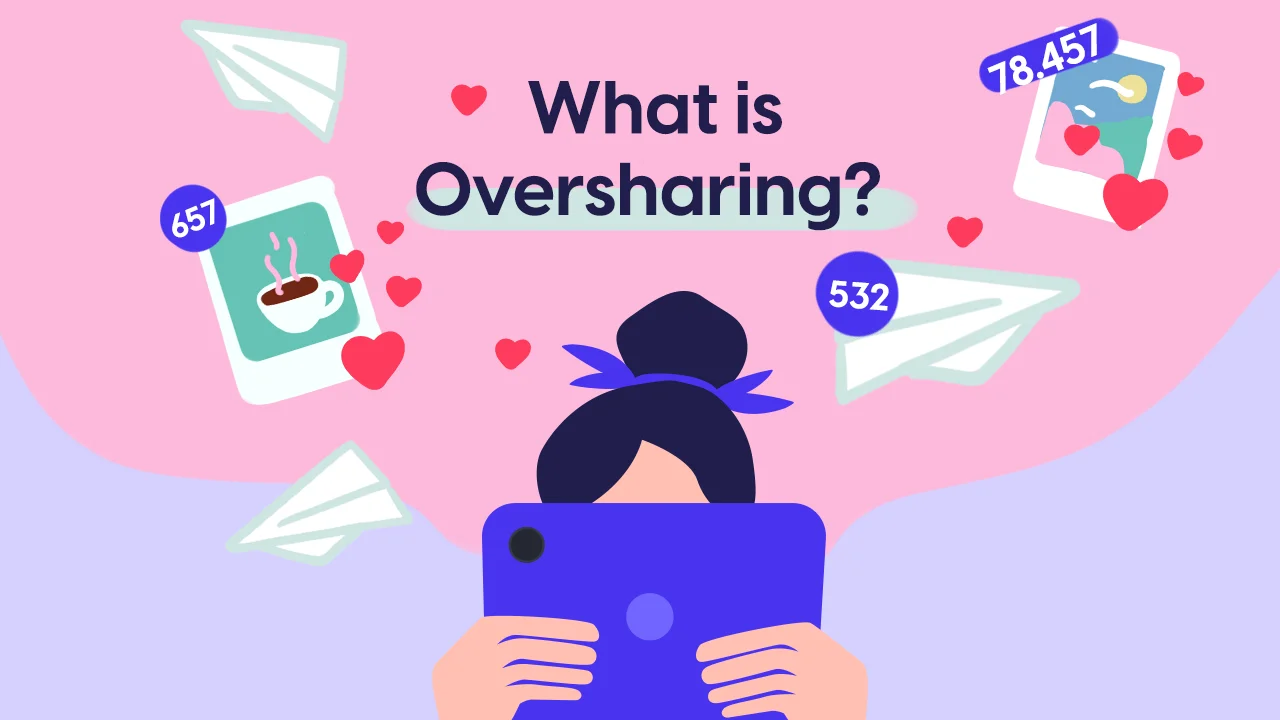
Start feeling better today!
Connect with your therapist today and take control of your life like our 500.000 happy clients.
The Need for Sharing
Sharing is an inherent need for all of us. It often makes us feel good to share our feelings, thoughts and experiences with the people we are close to.
Recently, social media platforms, which are a part of our lives, have emerged as one of our most preferred channels for sharing. By sharing through social media platforms, we can establish a "new world" and deepen our social ties there.
Social media gives us the opportunity to reach the masses instantly, and the freedom to share the content and the frequency we want. However, this freedom can also lead to theft or misuse of personal data.
What is Oversharing?
In addition to being dangerous in terms of security, the detailed personal data we share on social media also brings the potential to negatively affect our psychological state. The concept of “oversharing”, which has gained popularity recently, is exactly what defines this situation.
Oversharing is sharing personal life on social media with more details than necessary. Sharing every moment of our daily life on social media, from the place we go to the food we eat, can be given as an example of this concept.
Why do We Overshare?
Oversharing can be motivated by a variety of factors. One of the most important is the feeling of being alone and the need to connect with others. This situation may have occurred to any of us, particularly during the pandemic period. We turned to online alternatives after being physically isolated from the social environment for such a long time.
The feeling of inadequacy, the desire to prove oneself to others, and the anxiety of being ignored are considered other causes of oversharing. Studies have shown that oversharing becomes a defense mechanism for individuals with low self-esteem.
According to a study conducted in 2012, it was emphasized that excessive sharing stems from the tendency to reveal emotions. Underlying this situation is the idea that "if I show how I feel, they will understand me better." In addition, creating an ideal "me" by creating a different identity on social media may cause an individual to experience identity confusion.
Sharing posts saying to be always and exaggeratedly happy might be an example of this confusion, given that it is not always possible to be filled with such high emotions in everyday life.
In addition, criticism and comments about the posts can significantly affect the mood of the person. The strength of this effect will be proportional to the amount of value we attach to the posts we share.
How Can We Reduce Oversharing?
Sometimes we may not be aware that we are oversharing. Underestimating this situation can lead to an increase in the time we spend on the screen and even to social media addiction.
Some people, for example, believe that not sharing is a defect. Although we may perceive this defect as a necessity or a habit, considering the primary causes of oversharing and understanding why and for what purpose we share information may help raise awareness.
Being completely isolated from social media does not seem as a solution. However, limiting the content or number of posts can help prevent oversharing and its long-term negative effects.
Sharing your personal details only with close friends, not publicly, can be a good start to limit oversharing. In addition, if excessive sharing becomes chronic and is seen as a need, getting psychological support can prevent the triggering of mental health problems.
Sources
Agger, B. (2012). Oversharing: Presentations of self in the internet age. Routledge.
Algül, A. (2018). Sosyal ağ kullanıcılarının abartılı paylaşım, benlik sunumu ve mahremiyet tüketimleri. Marmara Üniversitesi Öneri Dergisi, 13(49), 21-44.
BlaCkhart, G. C., Williamson, J., & Nelson, L. (2015). Social anxiety in relation to self-control depletion following social interactions. Journal of social and clinical psychology, 34(9), 747-773.
Mc Mahon, C. (2019). The psychology of social media. Routledge.
Rolls, K. D., Massey, D., & Elliott, R. M. (2019). Social media for researchers: beyond cat videos, oversharing, and narcissism. Australian Critical Care, 351-352.
Rose, C. (2011). The security implications of ubiquitous social media. International Journal of Management & Information Systems (IJMIS), 15(1).









